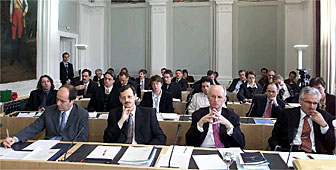Liechtenstein parliament prepares to negotiate with prince

The parliament of tiny Liechtenstein has decided to negotiate with the county's head of state to avoid a constitutional crisis.
Prince Hans-Adam II has threatened to go into self-imposed exile, if the government does not agree to give him more political power.
On Thursday, the parliament decided after a lengthy – and sometimes emotional – debate to look into constitutional reform. But the politicians are wary of handing over extra powers to prince at the expense of democracy, giving him to much influence in the choice of judges or in constitutional matters.
The parliamentarians have therefore chosen to send a delegation to negotiate with Hans-Adam, in the hope he will not carry out his threat of leaving the country.
Their chances of success seem however slim. In an interview with the daily newspaper “Liechtensteiner Vaterland” on Saturday, the prince said he would leave the country and probably move to Vienna if his reforms were not pushed through.
“I love this country, however, this love cannot be one-sided. If I am no longer wanted, I will go,” he said in the interview.
A recent survey showed that the majority of the population opposes constitutional reform, but also that most Liechtensteiners would hate to see their monarch go.
Princely powers
In his package of reforms, Hans-Adam is calling for the federal court to give up its authority to arbitrate. He also wants to reign under emergency laws for a period of six months and wants the power to sack the whole cabinet after a vote of no confidence.
The dispute between the monarch and the government of Liechtenstein dates back to 1992, when the two squabbled over setting a date for a referendum for membership in the European Economic Area.
At the time, Hans-Adam tried to dissolve the whole parliament and reign under emergency law.
Switzerland’s role
The development of the future politics in this tiny principality is of interest to Switzerland as the two neighbours are economically entwined.
In 1923 Liechtenstein and Switzerland signed a tariff and trade agreement, which has evolved into a full-blown economic, monetary and postal union over the past years.
However, in addition to their economic union, the two countries have a lot in common when it comes to their respective banking systems.
Switzerland and Liechtenstein have recently been faced with international criticism over banking secrecy. The principality was temporarily put on a blacklist by the Organisation for Economic Cooperation and Development (OECD) for harbouring front companies.
However, despite the occasional dodgy business in Liechtenstein, Switzerland can call itself lucky for having such a neighbour, says Reiner Eichenberger, professor of economics at the University of Fribourg.
“It is very important for Switzerland that the pressure to lift the banking secrecy laws is spread out to other countries. Without an ally such as Liechtenstein, Switzerland would be alone in its role as sinner,” he told swissinfo.
He also thinks that Liechtenstein without a monarch would lose out on tourism quite significantly.
“If he really goes, it will have an immense impact on tourism as the country will no longer be the same without a monarch,” Eichenberger said.
Without its monarchy, Liechtenstein would have to rethink its strategy for tourism and find a new way to market the small “Ländle”, he said.
swissinfo with agencies

In compliance with the JTI standards
More: SWI swissinfo.ch certified by the Journalism Trust Initiative
You can find an overview of ongoing debates with our journalists here . Please join us!
If you want to start a conversation about a topic raised in this article or want to report factual errors, email us at english@swissinfo.ch.